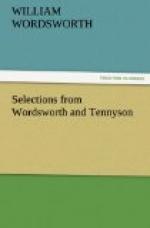Professor Dowden has also laid stress upon the harmonious balance of Wordsworth’s nature, his different faculties seeming to interpenetrate one another, and yield mutual support. He has likewise called attention to the austere naturalism of which Arnold speaks. “Wordsworth was a great naturalist in literature, but he was also a great Idealist; and between the naturalist and the idealist in Wordsworth no opposition existed: each worked with the other, each served the other. While Scott, by allying romance with reality, saved romantic fiction from the extravagances and follies into which it had fallen, Wordsworth’s special work was to open a higher way for naturalism in art by its union with ideal truth.”
Criticism has long since ceased to ridicule his Betty Foy, and his Harry Gill, whose “teeth, they chatter, chatter still.” Such malicious sport proved only too easy for Wordsworth’s contemporaries, and still the essential value of his poetry was unimpaired.
The range of poetry is indeed inexhaustible, and even the greatest poets must suffer some subtraction from universal pre-eminence. Therefore we may frankly admit the deficiencies of Wordsworth,—that he was lacking in dramatic force and in the power of characterization; that he was singularly deficient in humor, and therefore in the saving grace of self-criticism in the capacity to see himself occasionally in a ridiculous light; that he has little of the romantic glamor and none of the narrative energy of Scott; that Shelley’s lyrical flights leave him plodding along the dusty highway; and that Byron’s preternatural force makes his passion seen by contrast pale and ineffectual. All this and more may freely be granted, and yet for his influence upon English thought, and especially upon the poetic thought of his country, he must be named after Shakespeare and Milton. The intellectual value of his work will endure; for leaving aside much valuable doctrine, which from didactic excess fails as poetry, he has brought into the world a new philosophy of Nature and has emphasised in a manner distinctively his own the dignity of simple manhood.—Pelham Edgar.
REFERENCES ON WORDSWORTH’S LIFE AND WORKS
Wordsworth by F. W. H. Myers, in English Men of Letters series. Toronto: The Macmillan Company of Canada, Limited.
Wordsworth by Walter Raleigh, London: Edward Arnold.
Wordsworth by Rosaline Masson, in The People’s Books series. London: T. C. & E. C. Jack,
Wordsworthiana edited by William Knight. Toronto: The Macmillan Company of Canada, Limited.
Essays Chiefly on Poetry by Aubrey de Vere, 2 volumes. Toronto: The Macmillan Company of Canada, Limited.
Literary Essays by Richard Holt Hutton. Toronto: The Macmillan Company of Canada, Limited.
Studies in Literature by Edward Dowden. London: Kegan Paul, Trench, Trubner & Co., Ltd.




